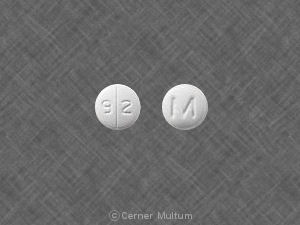What is the most important information I should know about maprotiline?
You should not use maprotiline if you have a seizure disorder, or if you recently had a heart attack.
Do not use this medicine if you have used an MAO inhibitor in the past 14 days, such as isocarboxazid, linezolid, methylene blue injection, phenelzine, rasagiline, selegiline, or tranylcypromine.
Some young people have thoughts about suicide when first taking an antidepressant. Stay alert to changes in your mood or symptoms. Report any new or worsening symptoms to your doctor.
What is maprotiline?
Maprotiline is an antidepressant. Maprotiline affects chemicals in the brain that may be unbalanced in people with depressive disorders.
Maprotiline is used to treat major depressive disorder, depressive neurosis, manic depressive illness, or anxiety related to depression.
Maprotiline may also be used for purposes not listed in this medication guide.
What should I discuss with my healthcare provider before taking maprotiline?
You should not use maprotiline if you are allergic to it, or:
- if you have a seizure disorder; or
- if you recently had a heart attack.
Do not use maprotiline if you have used an MAO inhibitor in the past 14 days. A dangerous drug interaction could occur. MAO inhibitors include isocarboxazid, linezolid, methylene blue injection, phenelzine, rasagiline, selegiline, tranylcypromine, and others.
To make sure maprotiline is safe for you, tell your doctor if you have:
- a history of seizures or epilepsy;
- bipolar disorder (manic depression);
- narrow-angle glaucoma;
- heart disease or a heart rhythm disorder;
- a history of heart attack or stroke;
- urination problems;
- liver or kidney disease;
- overactive thyroid; or
- a condition for which you are receiving electroshock therapy.
Some young people have thoughts about suicide when first taking an antidepressant. Your doctor should check your progress at regular visits. Your family or other caregivers should also be alert to changes in your mood or symptoms.
You may have thoughts about suicide while taking an antidepressant, especially if you are younger than 24 years old. Tell your doctor if you have worsening depression or suicidal thoughts during the first several weeks of treatment, or whenever your dose is changed.
It is not known whether this medicine will harm an unborn baby. Tell your doctor if you are pregnant or plan to become pregnant.
Maprotiline can pass into breast milk and may harm a nursing baby. Tell your doctor if you are breast-feeding a baby.
Older adults may be more sensitive to the effects of this medicine.
Maprotiline is not approved for use by anyone younger than 18 years old.
How should I take maprotiline?
Follow all directions on your prescription label. Your doctor may occasionally change your dose to make sure you get the best results. Do not use this medicine in larger or smaller amounts or for longer than recommended.
It may take up to 3 weeks before your symptoms improve. Keep using the medication as directed and tell your doctor if your symptoms do not improve.
Call your doctor if your symptoms do not improve, or if they get worse.
If you need surgery, tell the surgeon ahead of time that you are using maprotiline. You may need to stop using the medicine for a short time.
Store at room temperature away from moisture, heat, and light.
What happens if I miss a dose?
Take the missed dose as soon as you remember. Skip the missed dose if it is almost time for your next scheduled dose. Do not take extra medicine to make up the missed dose.
What happens if I overdose?
Seek emergency medical attention or call the Poison Help line at 1-800-222-1222. An overdose of maprotiline can be fatal.
Overdose symptoms may include extreme drowsiness or weakness, loss of balance, agitation, fast or irregular heart rate, vomiting, fever, stiff muscles, blue lips or fingernails, fainting, and seizure (convulsions).
What should I avoid while taking maprotiline?
This medicine may impair your thinking or reactions. Be careful if you drive or do anything that requires you to be alert.
Do not drink alcohol. Dangerous side effects or death can occur when alcohol is combined with maprotiline. Check your food and medicine labels to be sure these products do not contain alcohol.
What are the possible side effects of maprotiline?
Get emergency medical help if you have signs of an allergic reaction: hives; difficult breathing; swelling of your face, lips, tongue, or throat.
Report any new or worsening symptoms to your doctor, such as: mood or behavior changes, anxiety, panic attacks, trouble sleeping, or if you feel impulsive, irritable, agitated, hostile, aggressive, restless, hyperactive (mentally or physically), more depressed, or have thoughts about suicide or hurting yourself.
Call your doctor at once if you have:
- a light-headed feeling, like you might pass out;
- confusion, hallucinations;
- unusual thoughts or behavior;
- memory problems;
- fever, sore throat; or
- jaundice (yellowing of the skin or eyes).
Common side effects may include:
- blurred vision;
- dry mouth;
- nausea, constipation;
- feeling nervous, anxious, or agitated;
- sleep problems (insomnia);
- dizziness, drowsiness;
- feeling weak or tired;
- headache; or
- tremors.
This is not a complete list of side effects and others may occur. Call your doctor for medical advice about side effects. You may report side effects to FDA at 1-800-FDA-1088.
What other drugs will affect maprotiline?
Taking this medicine with other drugs that make you sleepy can worsen this effect. Ask your doctor before taking maprotiline with a sleeping pill, narcotic pain medicine, muscle relaxer, or medicine for anxiety, depression, or seizures.
Tell your doctor about all your current medicines and any you start or stop using, especially:
- any other antidepressant;
- cimetidine (Tagamet);
- guanethidine;
- bladder or urinary medicines such as darifenacin, fesoterodine, oxybutynin, tolterodine, solifenacin;
- bronchodilators such as aclidinium, ipratropium, tiotropium, or umeclidinium;
- cold or allergy medicine;
- diet pills, stimulants, ADHD medication (such as Ritalin or Adderall);
- medication for Parkinson's disease;
- medication to treat excess stomach acid, stomach ulcer, motion sickness, or irritable bowel syndrome;
- medicine to treat a psychiatric disorder;
- a sedative such as Valium, Versed, Xanax, and others; or
- seizure medicine such as phenytoin or phenobarbital.
This list is not complete. Other drugs may interact with maprotiline, including prescription and over-the-counter medicines, vitamins, and herbal products. Not all possible interactions are listed in this medication guide.
Where can I get more information?
Your pharmacist can provide more information about maprotiline.
Remember, keep this and all other medicines out of the reach of children, never share your medicines with others, and use this medication only for the indication prescribed.
Every effort has been made to ensure that the information provided by Cerner Multum, Inc. ('Multum') is accurate, up-to-date, and complete, but no guarantee is made to that effect. Drug information contained herein may be time sensitive. Multum information has been compiled for use by healthcare practitioners and consumers in the United States and therefore Multum does not warrant that uses outside of the United States are appropriate, unless specifically indicated otherwise. Multum's drug information does not endorse drugs, diagnose patients or recommend therapy. Multum's drug information is an informational resource designed to assist licensed healthcare practitioners in caring for their patients and/or to serve consumers viewing this service as a supplement to, and not a substitute for, the expertise, skill, knowledge and judgment of healthcare practitioners. The absence of a warning for a given drug or drug combination in no way should be construed to indicate that the drug or drug combination is safe, effective or appropriate for any given patient. Multum does not assume any responsibility for any aspect of healthcare administered with the aid of information Multum provides. The information contained herein is not intended to cover all possible uses, directions, precautions, warnings, drug interactions, allergic reactions, or adverse effects. If you have questions about the drugs you are taking, check with your doctor, nurse or pharmacist.
Copyright 1996-2018 Cerner Multum, Inc. Version: 3.01. Revision date: 9/7/2016.


